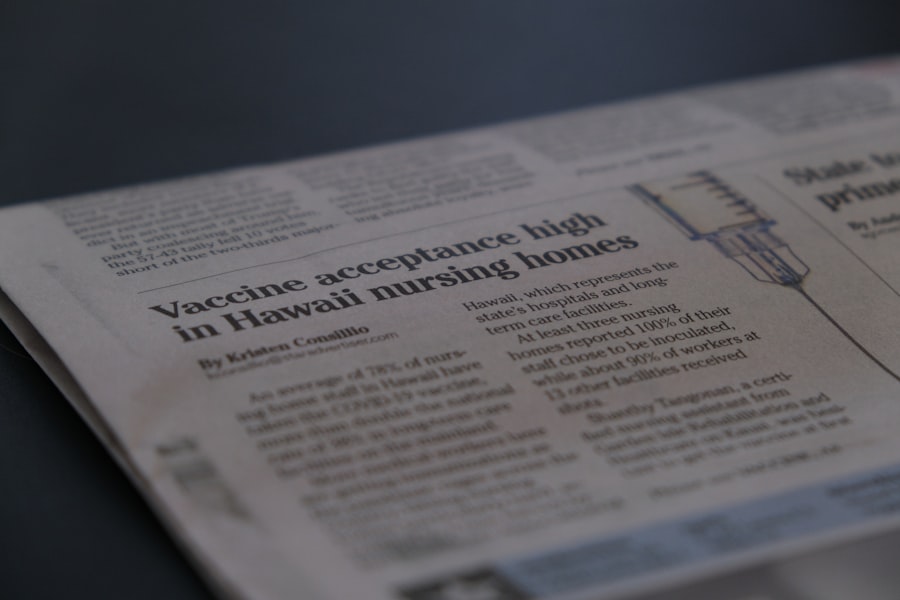Confirmation bias is a cognitive phenomenon that influences how you process information and form beliefs. It refers to the tendency to favor information that confirms your preexisting beliefs while disregarding or minimizing evidence that contradicts them. This bias can manifest in various aspects of life, from political opinions to personal relationships, shaping your worldview in subtle yet profound ways.
When you encounter new information, you may unconsciously filter it through the lens of your existing beliefs, leading to a skewed understanding of reality. Understanding confirmation bias is crucial because it affects not only individual decision-making but also societal dynamics. You might find yourself gravitating toward news sources or social media feeds that align with your views, reinforcing your beliefs and creating echo chambers.
This self-reinforcing cycle can make it challenging to engage with differing perspectives, ultimately limiting your ability to think critically and adapt your views based on new evidence.
Key Takeaways
- Confirmation bias is the tendency to search for, interpret, favor, and recall information in a way that confirms one’s preexisting beliefs or hypotheses.
- Confirmation bias can lead to distorted thinking, poor decision making, and the perpetuation of false beliefs.
- Confirmation bias affects decision making by influencing the way information is gathered, interpreted, and used to make decisions.
- Confirmation bias plays a significant role in polarization and division by reinforcing existing beliefs and creating echo chambers.
- Media and information consumption can be heavily influenced by confirmation bias, leading to selective exposure and interpretation of information.
The Psychological Impact of Confirmation Bias
The psychological impact of confirmation bias can be significant, as it shapes your cognitive processes and emotional responses. When you encounter information that aligns with your beliefs, it can evoke feelings of validation and satisfaction. Conversely, when faced with contradictory evidence, you may experience discomfort or cognitive dissonance, leading you to dismiss or rationalize away the conflicting information.
This emotional response can create a feedback loop, where the more you cling to your beliefs, the more resistant you become to change. Moreover, confirmation bias can affect your self-esteem and identity. If your beliefs are challenged, you might feel threatened, as they are often tied to your sense of self.
This can lead to defensiveness and an unwillingness to engage in constructive dialogue. Recognizing this psychological impact is essential for fostering open-mindedness and resilience in the face of new information.
How Confirmation Bias Affects Decision Making

Your decision-making processes are often influenced by confirmation bias, which can lead to suboptimal choices. When you seek out information that supports your existing beliefs, you may overlook critical data that could inform a more balanced perspective. This selective attention can result in poor judgments, whether in personal finance, health decisions, or even interpersonal relationships.
For instance, if you believe a particular investment is sound, you might ignore warning signs or expert advice that suggests otherwise. Additionally, confirmation bias can create a false sense of certainty in your decisions. When you surround yourself with like-minded individuals or sources that reinforce your views, you may feel more confident in your choices than warranted.
This overconfidence can lead to riskier decisions and a lack of preparedness for potential negative outcomes. To make well-informed decisions, it’s essential to actively seek out diverse viewpoints and challenge your assumptions.
The Role of Confirmation Bias in Polarization and Division
| Metrics | Confirmation Bias Impact |
|---|---|
| Political Polarization | Confirmation bias reinforces existing beliefs, leading to increased polarization |
| Media Consumption | People tend to seek out information that confirms their existing beliefs, leading to selective exposure |
| Decision Making | Confirmation bias can lead to biased decision making and hinder critical thinking |
| Social Media Echo Chambers | Confirmation bias contributes to the formation of echo chambers on social media platforms |
In today’s increasingly polarized society, confirmation bias plays a significant role in deepening divisions between groups. As you engage with information that aligns with your beliefs, you may become more entrenched in your views, leading to an “us versus them” mentality. This polarization can manifest in various contexts, from political affiliations to social issues, creating an environment where constructive dialogue becomes increasingly difficult.
The impact of confirmation bias on polarization is further exacerbated by social media algorithms that curate content based on your preferences. These algorithms often prioritize sensational or emotionally charged content that reinforces existing beliefs, creating echo chambers that isolate you from differing perspectives. As a result, the gap between opposing viewpoints widens, making it challenging to find common ground and fostering an environment ripe for conflict.
Confirmation Bias in Media and Information Consumption
Your media consumption habits are heavily influenced by confirmation bias, as you tend to gravitate toward sources that align with your beliefs. This selective exposure can create a distorted view of reality, as you may only encounter information that supports your existing opinions while ignoring alternative viewpoints. The rise of digital media has amplified this phenomenon, with algorithms curating content tailored to your preferences and reinforcing your biases.
Moreover, the prevalence of misinformation in today’s media landscape complicates the issue further. When you consume news or information that aligns with your beliefs but lacks factual accuracy, it can solidify misconceptions and perpetuate false narratives. To combat this effect, it’s essential to diversify your sources of information and critically evaluate the credibility of the content you consume.
How Confirmation Bias Can Lead to Misinformation and Misinterpretation

Confirmation bias can significantly contribute to the spread of misinformation and misinterpretation of facts. When you encounter information that aligns with your beliefs, you may accept it without scrutiny, leading to the propagation of false narratives. This tendency can be particularly dangerous in contexts such as public health or political discourse, where misinformation can have real-world consequences.
Additionally, confirmation bias can lead to selective interpretation of ambiguous information. You might interpret data or statements in a way that supports your beliefs while ignoring alternative explanations. This selective interpretation can create a distorted understanding of complex issues and hinder productive discussions.
Confirmation Bias in the Workplace and Professional Settings
In professional settings, confirmation bias can impact collaboration and decision-making processes. When working in teams, individuals may gravitate toward ideas that align with their preexisting beliefs while dismissing alternative viewpoints. This bias can stifle creativity and innovation, as diverse perspectives are essential for problem-solving and effective decision-making.
Moreover, confirmation bias can affect performance evaluations and hiring practices.
To foster a more inclusive and effective workplace culture, it’s vital to recognize these biases and actively seek out diverse perspectives during discussions and evaluations.
The Connection Between Confirmation Bias and Prejudice
Confirmation bias is closely linked to prejudice and discrimination, as it reinforces stereotypes and preconceived notions about individuals or groups. When you hold biased beliefs about a particular demographic, you may selectively interpret information in a way that confirms those biases while ignoring evidence that contradicts them. This process perpetuates harmful stereotypes and contributes to systemic discrimination.
Furthermore, confirmation bias can create an environment where prejudiced beliefs are normalized within social circles or communities. When individuals surround themselves with like-minded people who share their biases, it becomes easier to dismiss opposing viewpoints and reinforce discriminatory attitudes. To combat this connection between confirmation bias and prejudice, it’s essential to engage in self-reflection and challenge your assumptions about others.
Overcoming Confirmation Bias: Strategies for Critical Thinking
Overcoming confirmation bias requires intentional effort and a commitment to critical thinking. One effective strategy is to actively seek out diverse perspectives and engage with individuals who hold differing beliefs. By exposing yourself to alternative viewpoints, you can challenge your assumptions and broaden your understanding of complex issues.
Another approach is to practice reflective thinking by questioning your beliefs and the evidence supporting them. Consider the sources of information you rely on and evaluate their credibility objectively. Engaging in discussions with others who have different viewpoints can also help you refine your thinking and develop a more nuanced understanding of various topics.
The Impact of Confirmation Bias on Personal Relationships
Confirmation bias can significantly impact personal relationships by shaping how you perceive others and interpret their actions. When you hold preconceived notions about someone—whether positive or negative—you may selectively focus on behaviors that confirm those beliefs while overlooking contradictory evidence. This tendency can lead to misunderstandings and conflicts within relationships.
Moreover, confirmation bias can create barriers to effective communication. If you approach conversations with a fixed mindset about someone’s intentions or character, it may hinder your ability to listen actively and empathize with their perspective. To foster healthier relationships, it’s essential to remain open-minded and willing to reassess your beliefs about others based on new experiences and interactions.
The Importance of Recognizing and Addressing Confirmation Bias
Recognizing and addressing confirmation bias is crucial for personal growth and societal progress. By becoming aware of how this cognitive bias influences your thoughts and behaviors, you can take proactive steps toward more balanced decision-making and open-mindedness. Acknowledging the existence of confirmation bias allows you to challenge your assumptions and engage more constructively with differing perspectives.
In a broader context, addressing confirmation bias is essential for fostering dialogue and understanding within society. By promoting critical thinking and encouraging individuals to confront their biases, we can work toward bridging divides and creating a more inclusive environment for discussion. Ultimately, recognizing confirmation bias empowers you to become a more informed individual capable of navigating complex issues with nuance and empathy.
Confirmation bias is a cognitive phenomenon where individuals favor information that confirms their pre-existing beliefs or hypotheses, often disregarding evidence to the contrary. This bias can significantly impact decision-making and critical thinking. A related article that delves into the intricacies of cognitive biases, including confirmation bias, can be found on the Hey Did You Know This website. For more insights, you can read the article by visiting this page. This resource provides a comprehensive overview of how cognitive biases shape our perceptions and decisions.
WATCH THIS! Don’t Believe Everything You Think — Your Brain Is A Master Trickster!
FAQs
What is confirmation bias?
Confirmation bias is the tendency to search for, interpret, favor, and recall information in a way that confirms one’s preexisting beliefs or hypotheses. It is a type of cognitive bias and can lead to errors in decision-making and reasoning.
How does confirmation bias affect decision-making?
Confirmation bias can lead individuals to overlook or dismiss information that contradicts their beliefs, leading to flawed decision-making. It can also contribute to the reinforcement of stereotypes and prejudices.
What are some examples of confirmation bias?
Examples of confirmation bias include selectively seeking out information that supports one’s political views, interpreting ambiguous evidence in a way that aligns with one’s beliefs, and dismissing feedback that challenges one’s self-perception.
How can confirmation bias be mitigated?
To mitigate confirmation bias, individuals can actively seek out diverse perspectives, critically evaluate information, and remain open to changing their beliefs in the face of new evidence. Additionally, seeking feedback from others and engaging in self-reflection can help reduce the impact of confirmation bias.
Is confirmation bias a universal phenomenon?
Confirmation bias is a common cognitive bias that affects people across cultures and demographics. It is a natural tendency of the human mind, but awareness and effort can help mitigate its impact.
